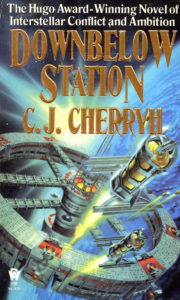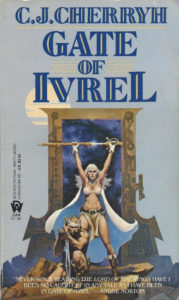 There’s a long history of women using pseudonyms, initials, and the ever popular “Anonymous”. Charlotte, Emily, and Anne Bronte were respectively Currer, Ellis, and Acton Bell. Mary Anne Evans was George Elliot and even today, Joanne Rowling became J. K. Rowling (and Robert Galbraith). Andrea Norton went for the ambiguous “Andre” and Alice Bradley Sheldon created the entire alter ego of James Tiptree. Mary Shelley’s first edition of Frankenstein was published as “Anonymous”. (It wasn’t until the second edition of 1822 that Mary Shelley was listed as the author.)
There’s a long history of women using pseudonyms, initials, and the ever popular “Anonymous”. Charlotte, Emily, and Anne Bronte were respectively Currer, Ellis, and Acton Bell. Mary Anne Evans was George Elliot and even today, Joanne Rowling became J. K. Rowling (and Robert Galbraith). Andrea Norton went for the ambiguous “Andre” and Alice Bradley Sheldon created the entire alter ego of James Tiptree. Mary Shelley’s first edition of Frankenstein was published as “Anonymous”. (It wasn’t until the second edition of 1822 that Mary Shelley was listed as the author.)
They’re all over the map, these disguises, but a major one lurking in the vastness of the universe, deep in the depths of Space Opera, is Carolyn Cherry, aka, C.J. Cherryh. She picked her name because Donald Wollheim, avid SF fan turned editor, worried that her name sounded “more romance novel” than science fiction author in 1976. And there’s so much about that that I just can’t even.
Born in 1942, C.J. Cherryh has written more than 80 books since the mid-1970s, including the Hugo Award-winning novels Downbelow Station and Cyteen, both set in her Alliance-Union universe in the epic Space Opera quadrant of the map.
Now, Space Opera as a sub-genre of SF had been around for quite a while, getting it’s start with the French (Les Posthumes (1802), by Nicolas Edme Retif, and Lumen (1872) by Camille Flammarion), but it wasn’t until the late 1920s that the pulps picked up the subject, particularly Amazing Stories and Weird Tales. The true father of the genre is probably E. E. “Doc” Smith, who created (along with Lee Hawkins Garby) The Skylark of Space, followed by the Lensmen series.
When she was about ten, young Carolyn fell in love with a T.V. show – Flash Gordon. After the show was cancelled, she turned to writing fanfic, but with a twist – she flipped the genders and never stopped, and the worlds originally based on other’s worlds, evolved into something very unique, and completely, her own.
C.J. Cherryh started her journey in 1976 towards that opera quadrant of space with the Morgaine trilogy (science fantasy) which included Gate of Ivrel (1976), Well of Shiuan (1978) and Fires of Azeroth (1979). She received the John W. Campbell award for best new writer in 1977 and her short story, “Cassandra” won best Hugo in 1979. The Faded Sun series followed, but it was in Downbelow Station (1982) and Cyteen (1988), both set in her Union-Alliance universe, that she dove whole-heartedly into the space opera genre, forever altering the map, and earning two Hugos as well.
Downbelow Station and Cyteen contain all the primal elements of the space opera – warfare, adventure, strategy, romance, and risk. Her universe involves word building on a truly epic scale of realism supported by her researches in history, language, psychology, and archeology. Much like a certain current writer, Cheryyh never shied away from intricate intrigue, and she had no qualms about killing off major characters in service of a logical plot.
 Her characters include strong women (particularly captain of the Norway, Signy Mallory), matriarchal hives, and heavily pregnant soldiers. Her universe sprawls with complex allegiances, trade wars, and labyrinthine relationships. Her plots are intricate and often disjointed as you view the universe from various tight points of view, each one with their own slant on events.
Her characters include strong women (particularly captain of the Norway, Signy Mallory), matriarchal hives, and heavily pregnant soldiers. Her universe sprawls with complex allegiances, trade wars, and labyrinthine relationships. Her plots are intricate and often disjointed as you view the universe from various tight points of view, each one with their own slant on events.
Carolyn Cherry opened up space for the writers who followed her into space opera, particularly Lois McMaster Bujold and Ann Leckie (who won the 2014 Hugo for Ancillary Justice).
Currently at over 80 books (and still counting), C.J. Cheryhh is still writing. Her latest, Alliance Rising (written with Jane Fancher) returns once again to the Union-Alliance universe and was published in this January (2019).
And, for the record, Cherryh is pronounced “Cherry,” same as her “real” name. The “h” is silent.



No Comments